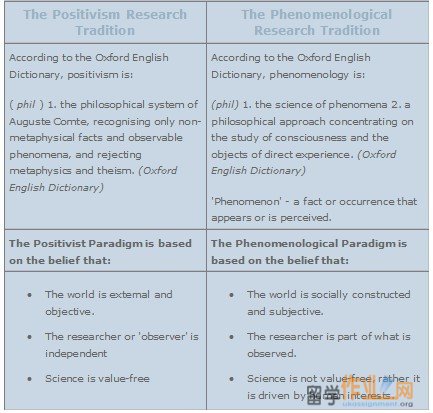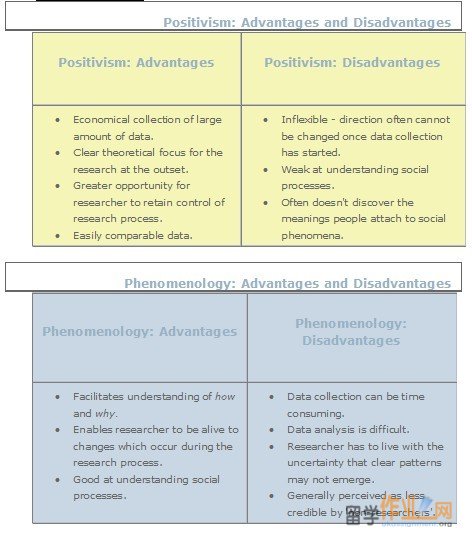|
指导assignment:Research Paradigms assignment
第一部分,两个概述主要研究传统,识别的主要特征。这些研究传统研究方法的含义是什么?
This assignment will enable you to clarify you understanding of the two main research readitions and how they impact on research undertaken in the international business field.
Research Paradigms  iven this difference of perspective and emphasis, the Positivist Paradigm: Focuses on facts. Looks for causality and fundamental laws. Reduces phenomena to simplest elements in order that phenomena can be measured and quantified. Whereas the Phenomenological Paradigm: Focuses on meanings. Tries to understand what is happening. Looks at the totality of each situation. Tries to develop ideas through induction from data.
Positivistic Research or Phenomenological Research - Does it matter?
Whilst there may be differences of opinion in relation to this, I would argue that your research project will have greater clarity, depth and significance if you decide, right from the outset, which of the two broad traditions you are comfortable with. There are a number of advantages in making this decision at the commencement of your research: Clear thinking at this early stage will help you make more informed decisions about your research design. It will determine which research methods you use, how you collect data, how you analyse data and how you interpret the findings arising from your data collection. It also forces you to think about which research approaches work best for you personally - do you want to discover why (phenomenological research) or describe what? (positivistic research). Making decisions at this stage will help you adapt your research to cater for the constraints of each research tradition. Having said that, business research is always pragmatic, and given its strong, practical orientation, there may be an argument for a third category or paradigm, namely realist research. According to Saunders et al , realist research falls somewhere between the two research traditions outlined above. It accepts that there is an objective reality out there (positivism) but also acknowledges the importance of human perspective and context (phenomenology). A summary of the advantages and disadvantages of positivism and phenomenology follow to help you consider your options and make a decision about your preferred research approach.  Positivism is a more Deductive Approach to Research Positivism is a more deductive approach to research. By deductive, I mean that it is based on: Scientific principles. The research process moves from theory-testing to data gathering. There is a requirement to explain causal relationships between variables It requires the collection of quantitative data. It is essential that there are controls in place to ensure clarity of definition. It is by necessity a highly structured approach, as every factor must be coded to enable analysis to take place. The researcher is independent of what is being researched. There is a necessity to select samples of sufficient size in order to be able to generalise from the conclusions.
Phenomenology is a more Inductive Approach to Research
Phenomenology is a more inductive approach to research. By inductive, I mean that it is based on: The idea that theory emerges from the process of data gathering. Its focus is on gaining an understanding of the meanings humans attach to events. It involves a close consideration and understanding of the actual context within which the research takes place. It involves the collection of qualitative data – in-depth interviews, focus groups, small group discussions, etc. It has a more flexible structure which enables changes to be made in terms of the research emphasis as the research progresses. It acknowledges that the researcher is part of the research process and involved in that process. There is less need to be able to generalise from the conclusions; the emphasis is on understanding a particular circumstance or research topic or situation.
Choosing a Research Strategy
Research Strategies may be: Exploratory Research seeks new insights or understanding of an issue or problem. It allows for considerable flexibility on the part of the researcher and the research process. The focus may be initially broad, becoming progressively narrower as the research progresses and as key issues emerge from the data gathering process. Descriptive Research is designed to portray an accurate profile of a particular phenomenon. There is always the risk of producing a 'so what' response in terms of the results of such research, given that it may merely describe a topic rather than shed light on it. In business research, it is a means to an end. Explanatory Research tries to establish and explain causal relationships (cause and effect) between different variables in the research project, in order to explain a particular phenomenon. The main research strategies are experiment, survey, case study, grounded theory, ethnography and action research. These may combine in a research project, depending on the aims and objectives of the research project. Read Chapter 4 of Saunders et al for further discussion of these and refer to the discussion topic 'Choosing a Research Strategy' to help you clarify the differences between each of these research strategies.
|
 |
|||
| 网站地图 |

